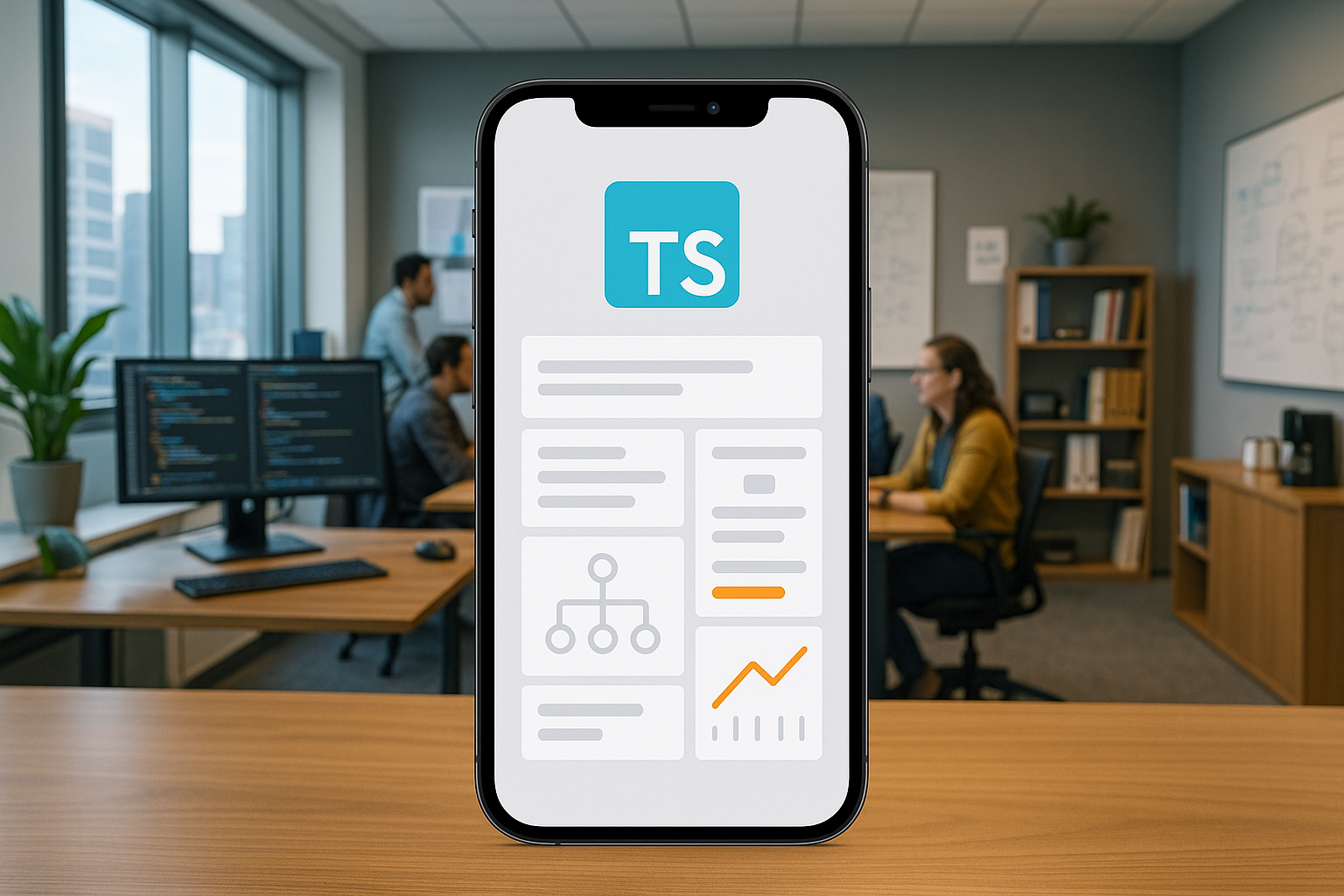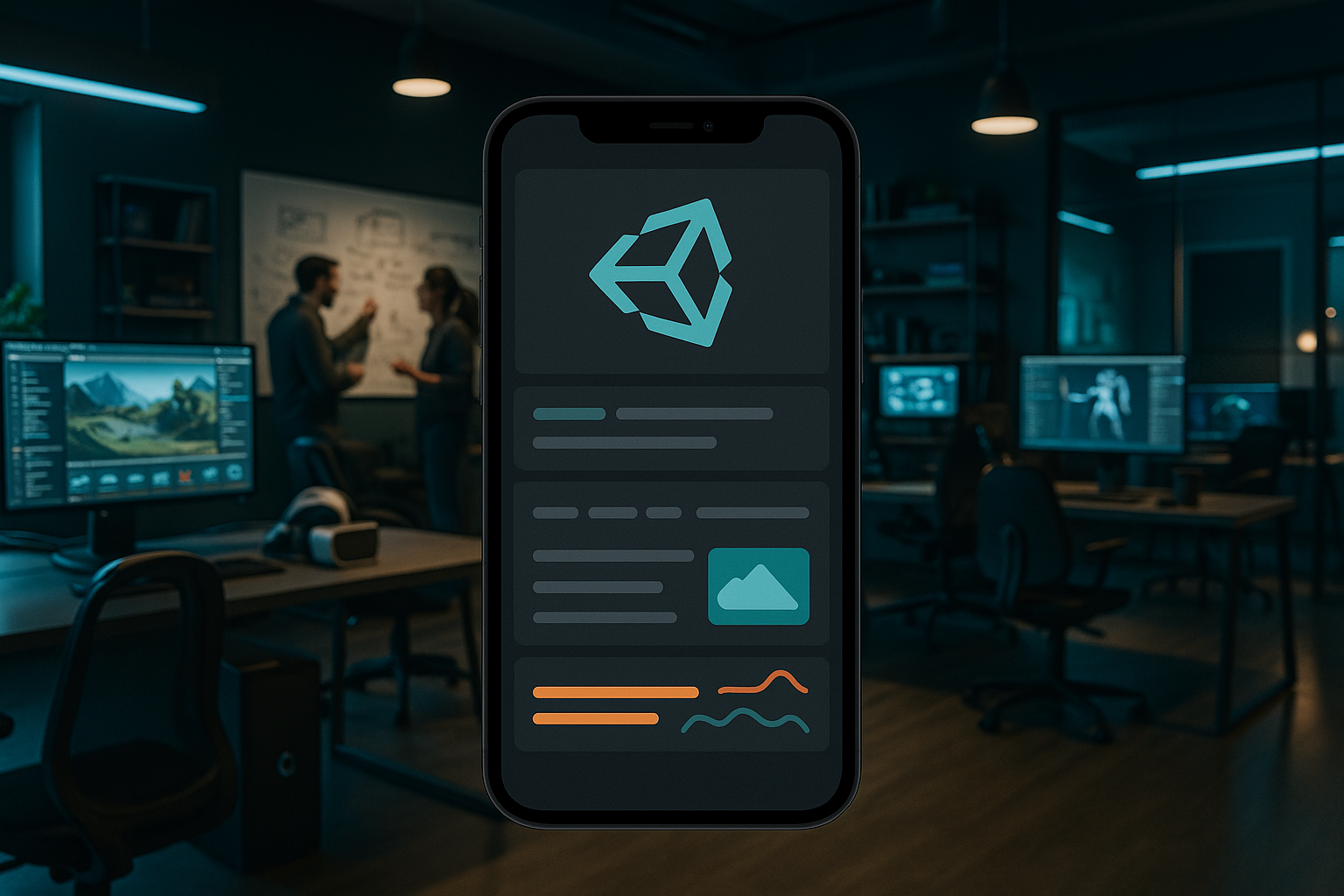Introduction
In today’s competitive digital landscape, launching a high-quality, scalable, and maintainable application is paramount. TypeScript, a statically typed superset of JavaScript, has emerged as a leading choice for developers aiming to build robust applications with fewer bugs and greater clarity. However, the path from an idea to a fully-functional TypeScript application is fraught with challenges. The complexities of its type system, the nuances of project configuration, and the demand for specialized expertise can quickly overwhelm even experienced in-house teams, leading to delays, budget overruns, and a final product that fails to meet business goals.
Navigating this complex terrain requires a strategic partner with deep technical knowledge and a proven track record. This article serves as a comprehensive guide to custom TypeScript app development. We will explore what a TypeScript app is, dissect the significant hurdles of in-house development, and explain why a custom development approach is often the most effective path to success. Furthermore, we will provide an overview of the top development companies that can bring your vision to life.
As a leading US-based, AI-powered app development firm with over two decades of experience, we at MetaCTO specialize in transforming complex requirements into market-ready applications. We understand the intricacies of TypeScript and leverage its power to build scalable and reliable software. Throughout this guide, we will share our insights to help you make informed decisions and set your project up for success from day one.
What is a TypeScript App?
At its core, a “TypeScript app” is any application—be it web, mobile, desktop, or server-side—where the source code is written in the TypeScript language. To understand its significance, one must first understand its relationship with JavaScript. JavaScript is the de facto language of the web, powering the interactive elements of virtually every website. However, its dynamic and loosely-typed nature can become a liability in large-scale projects, making code difficult to maintain, refactor, and debug.
TypeScript was developed by Microsoft to address these shortcomings. It is a strict syntactical superset of JavaScript, which means that any valid JavaScript code is also valid TypeScript code. The primary innovation of TypeScript is the addition of an optional static type system. In simple terms, this allows developers to define the “type” of data a variable, function parameter, or object property can hold—for example, specifying that a userID must always be a number or a userName must always be a string.
During the development process, a tool called the TypeScript compiler checks the code against these type definitions. If a developer mistakenly tries to assign a string to a variable that expects a number, the compiler flags it as an error before the code is ever run. This “compile-time” error checking catches a vast category of common bugs that would otherwise only surface during runtime, potentially crashing the application or leading to unpredictable behavior. After the code is checked, the compiler transpiles it into standard, clean, and highly compatible JavaScript that can run in any browser, on any server with Node.js, or in any other JavaScript environment.
The benefits of this approach are profound:
- Enhanced Code Quality and Readability: The type system acts as a form of documentation, making the code easier for developers to understand and reason about. This clarity is invaluable, especially in large teams or for long-term projects.
- Improved Maintainability and Scalability: As a codebase grows, refactoring and adding new features becomes exponentially more complex. TypeScript’s static typing ensures that changes in one part of the application do not unintentionally break another, providing a safety net that makes the software far more scalable.
- Superior Developer Experience: Modern code editors and IDEs leverage TypeScript’s type information to provide powerful features like intelligent code completion (IntelliSense), automated refactoring, and real-time error detection. This dramatically boosts developer productivity and reduces the cognitive load required to work with the code.
Because of these advantages, TypeScript has become the language of choice for many modern development frameworks, including Angular (which is built with it), and is a popular option for building applications with React, React Native, Node.js, and more.
Reasons That it is Difficult to Develop a TypeScript App In-House
While the benefits of TypeScript are clear, harnessing its full potential is not a simple task. Many organizations underestimate the challenges of building a sophisticated TypeScript application in-house, often leading to projects that are delayed, over budget, or fail to leverage the very advantages the language promises.
Steep Learning Curve and Expertise Gap
Transitioning a team from JavaScript to TypeScript involves more than just learning new syntax. It requires a fundamental shift in mindset toward a more structured, type-driven development paradigm. Mastering TypeScript’s advanced features—such as generics, decorators, conditional types, and module augmentation—is a significant undertaking. An in-house team without a seasoned TypeScript expert can easily misuse these features or write “TypeScript in name only,” where types are used superficially (any type everywhere), nullifying the language’s safety benefits. Finding, hiring, and retaining developers with deep TypeScript expertise is a highly competitive and costly endeavor, creating a significant bottleneck for companies trying to build a team from the ground up.
Complex Tooling and Configuration
A robust TypeScript project requires a carefully configured ecosystem of tools. This starts with the tsconfig.json file, which contains dozens of compiler options that dictate how the code is checked and transpiled. A misconfiguration can lead to a build process that is either too lenient (allowing errors to slip through) or too strict (hindering productivity). Beyond the compiler, the toolchain often includes linters (like ESLint), formatters (like Prettier), bundlers (like Webpack or Vite), and testing frameworks, all of which must be configured to work seamlessly with TypeScript. Setting up this complex environment correctly is a specialized skill that can consume significant development time if not handled by an experienced team.
Architectural and Scalability Challenges
Designing a scalable and maintainable architecture for a large TypeScript application is a complex discipline. It requires a deep understanding of software design patterns, dependency injection, state management strategies, and modular design principles that are well-suited for a statically-typed language. An inexperienced team may create a tightly-coupled “big ball of mud” architecture that is difficult to test, extend, and maintain. As the application grows, this “technical debt” accumulates, slowing down development and increasing the risk of introducing new bugs with every change.
The Difficulty of Migrating Legacy Code
For companies with existing JavaScript codebases, migrating to TypeScript is a delicate and often monumental task. A “big bang” migration, where the entire application is converted at once, is extremely risky and can halt all new feature development for months. A gradual migration, while safer, requires a meticulous strategy for interoperability between TypeScript and JavaScript modules. Managing type definitions for third-party JavaScript libraries and ensuring seamless integration without sacrificing type safety is a significant challenge that requires careful planning and execution.
Why Custom App Development for TypeScript
Given the substantial hurdles of in-house development, partnering with a specialized custom app development agency is often the most strategic and efficient path to a successful product. A dedicated agency like MetaCTO brings a wealth of experience, established processes, and a team of experts to the table, directly addressing the pain points that plague internal teams.
Immediate Access to Specialized Expertise
Instead of spending months searching for and hiring expensive talent, partnering with an agency gives you immediate access to a full team of vetted professionals. Our developers, architects, and project managers are not just familiar with TypeScript; they are experts who have honed their skills across dozens of projects. We understand the nuances of the language, stay current with the latest best practices and tooling, and know how to design robust, scalable architectures from the outset. This deep expertise ensures your application is built correctly from day one, avoiding the costly mistakes and technical debt that can arise from inexperience.
Accelerated Time-to-Market
In the business world, speed is a competitive advantage. We have spent years refining our development processes to be as efficient as possible. Our 90-day MVP service is designed to take your idea from concept to a market-ready application in record time. By leveraging our established workflows, pre-configured project templates, and reusable component libraries, we eliminate the setup and configuration overhead that slows down in-house teams. This allows us to focus directly on building the features that deliver value to your users, getting your product into their hands faster.
Cost-Effectiveness and Predictable Budgeting
While hiring an agency may seem like a significant upfront investment, it is often more cost-effective in the long run. The total cost of building an in-house team includes not only salaries but also recruitment fees, benefits, training, hardware, software licenses, and management overhead. Furthermore, the opportunity cost of project delays and a subpar final product can be immense. With a custom development partner, you get a predictable budget and a clear timeline. You pay for the results, not the overhead, ensuring a higher return on your investment.
End-to-End Product Development
Building a successful app involves much more than just writing code. At MetaCTO, we offer a holistic suite of services that cover the entire product lifecycle. This begins with Product Design & Discovery, where we conduct research and workshops to refine your vision and create a user-centered experience. It continues through our core mobile app development and AI development services, and extends to post-launch App Growth and Monetization strategies. This end-to-end approach ensures that every aspect of your product is aligned with your business goals, from the user interface to the revenue model.
Different Types of TypeScript Apps
TypeScript’s versatility as a superset of JavaScript means it can be used to build nearly any type of modern application. Its strong typing and scalability make it particularly well-suited for large and complex projects across various platforms.
Web Applications
This is the most common use case for TypeScript. It is the language of choice for building sophisticated Single-Page Applications (SPAs) and large-scale enterprise web platforms.
- Frameworks: TypeScript is the primary language for Angular, a comprehensive front-end framework developed by Google. It is also extremely popular in the React ecosystem, where it is used to build reusable, type-safe UI components. Other frameworks like Vue.js also have excellent TypeScript support.
- Benefits: For complex web apps with intricate state management and numerous components, TypeScript ensures that data flows correctly through the application, preventing common UI bugs and making the codebase easier to manage as it grows.
Backend and Server-Side Applications
TypeScript is increasingly used on the server-side with Node.js to build fast, scalable, and reliable backend services, APIs, and microservices.
- Frameworks: Frameworks like NestJS and Express.js (with TypeScript integration) provide a structured way to build robust server-side logic. TypeScript’s types are invaluable for defining API contracts (i.e., the shape of request and response objects), ensuring consistency and reducing integration errors between the frontend and backend.
- Benefits: In a backend environment, type safety prevents a wide range of runtime errors related to data handling, database interactions, and business logic, leading to more resilient and secure systems.
Cross-Platform Mobile Applications
TypeScript is a key technology for building mobile apps that run on both iOS and Android from a single codebase, significantly reducing development time and cost.
- Frameworks: React Native is the most prominent framework in this space. Developers use TypeScript and React to write the application logic, which is then rendered as native UI components on each platform. This approach provides a truly native look and feel without requiring separate Swift/Kotlin development teams.
- Benefits: Using TypeScript in a React Native project brings all the benefits of type safety to mobile development, helping to manage complex application states and ensure reliable communication with native device APIs.
Cost Estimate for Developing a TypeScript App
Determining the exact cost of a custom TypeScript app without a detailed project scope is impossible, as the price is influenced by a multitude of factors. However, understanding these factors can help you create a realistic budget and set clear expectations. A simple MVP might begin in the low five figures, while a complex, feature-rich enterprise application can easily run into the hundreds of thousands of dollars or more.
The primary drivers of cost include:
-
Project Scope and Complexity: This is the single most significant factor. The cost will scale with the number and complexity of features. An application with basic CRUD (Create, Read, Update, Delete) functionality will be far less expensive than one requiring real-time data streaming, third-party API integrations, complex business logic, or advanced features like AI and machine learning. The number of unique screens, user roles, and supported platforms also contributes heavily to the overall scope.
-
UI/UX Design: A simple, template-based design is more affordable than a fully custom, high-fidelity UI/UX design process. The latter involves extensive user research, wireframing, prototyping, and usability testing to create a polished and intuitive user experience. While it adds to the upfront cost, a strong design is critical for user adoption and retention and provides a significant return on investment.
-
Development Team: The size, experience, and location of the development team are major cost variables. A senior-level team from a US-based agency like MetaCTO will have a higher hourly rate than a junior team or an offshore agency. However, this higher rate often translates to greater efficiency, higher quality code, and faster problem-solving, which can result in a lower total project cost and a superior final product.
-
Technology Stack: While the core is TypeScript, the surrounding technologies—backend frameworks, cloud services (AWS, Azure, Google Cloud), database solutions, and third-party services (for payments, mapping, etc.)—all have associated costs, both in terms of integration effort and potential licensing fees.
-
Post-Launch Support and Maintenance: The project does not end at launch. Ongoing costs for hosting, monitoring, bug fixes, security patches, and future feature updates should be factored into the total cost of ownership.
Top TypeScript App Development Companies
Selecting the right development partner is the most critical decision you will make for your project’s success. Below is a list of top-tier companies with proven expertise in cross-platform and TypeScript development.
1. MetaCTO
As a premier US-based AI-powered app development agency, we at MetaCTO bring over 20 years of experience to every project. We have successfully launched over 100 applications and have a proven track record of helping our clients succeed, from securing over $40M in fundraising to achieving significant revenue growth. Our 5.0-star rating on Clutch reflects our unwavering commitment to quality, communication, and delivering results.
We specialize in building custom, market-ready applications that solve real business problems. Our expertise is not limited to a single technology; we provide a full suite of services, including Product Design & Discovery, Mobile App Development, AI Development, App Growth, and Monetization. This holistic approach ensures that we are not just a code vendor but a strategic partner invested in your long-term success. Our 90-day MVP service is a testament to our efficiency, allowing you to go from idea to launch quickly without sacrificing quality. Brands like ATP, Carlyle, and Liverpool FC trust us to deliver, and our case studies with clients like Mamazen and kommu showcase our ability to drive tangible business outcomes, such as increasing user activation by 73% through AI-driven onboarding.
| Services & Expertise | Tech Stack | Industries | Clients |
|---|---|---|---|
| Custom Mobile App Development, AI Development, App Growth & Monetization, Fractional CTO, Product Design & Discovery, 90-Day MVP | TypeScript, AI (GPT-4), Modern Mobile & Web Frameworks | Wellness & Meditation, Social & Dating, EdTech, FinTech | ATP, Carlyle, Liverpool FC, Mamazen, kommu, Parrot Club, Bond, G-Sight Solutions |
2. IT Craft
IT Craft is a top-rated cross-platform development company with a team of over 250 experts. They have earned multiple five-star reviews for their deep expertise and a value-focused approach to client projects. IT Craft is proficient in building native-like iOS and Android apps using a single codebase with popular frameworks like React Native, .NET MAUI, and Flutter. Their portfolio of over 2,250 completed projects includes transforming a legacy field management system into a cross-platform solution and integrating complex charts into a trading platform’s mobile app using React Native, exceeding client expectations. Their engineers emphasize proactive implementation and transparent communication, helping clients meet business goals by suggesting value-generating features and producing high-quality source code.
| Services & Expertise | Tech Stack | Industries | Team Size |
|---|---|---|---|
| Cross-platform Mobile App Development, Custom Software Development, MVP Development, DevOps and Maintenance, App Modernization | React Native, Flutter, .NET MAUI, Angular, React, Node.js, TypeScript, Python, AWS, Azure, Google Cloud | Fintech, Healthcare, Ecommerce, Logistics, Fantasy Sports, HR Management | 250+ experts |
3. LeanCode
LeanCode’s primary specialization is cross-platform app development using the Flutter Framework, though their expertise also extends to React Native and TypeScript. With a team of over 75 experts, they focus on delivering end-to-end services that decrease time to market and development costs by utilizing a single codebase. LeanCode has developed significant expertise in industries like banking, FinTech, and HRTech. Their project highlights include delivering a secure client app for a major bank (Credit Agricole Poland), a Flutter app for hiring temporary restaurant workers, and a meditation app with gamification features. In addition to development, they offer cloud automation, IT consulting, and app audit services.
| Services & Expertise | Tech Stack | Industries | Team Size |
|---|---|---|---|
| Cross-platform App Development, MVP Development, Hybrid App Development, App Maintenance, IT Staff Augmentation | Flutter, React Native, .NET, Node.js, TypeScript, Kubernetes, AWS, Azure | Banking, HRTech, InsurTech, MarTech, EduTech | 75+ experts |
4. Binary Studio
Binary Studio has strong expertise in cross-platform technologies like React Native and Flutter, which they use to build mobile apps from scratch, finalize ongoing projects, and modernize legacy software. With a team of over 160 experts, they focus on building long-term partnerships with clients by offering flexible cooperation terms, including end-to-end solutions and dedicated teams. Their strong portfolio showcases their ability to tackle diverse projects, such as expanding a lending portal with a React Native app, developing SOS mobile apps for Android and iOS, and designing a cross-platform application for managing spa salons.
| Services & Expertise | Tech Stack | Industries | Team Size |
|---|---|---|---|
| MVP Development, Cross-platform and Hybrid App Development, Software Modernization, Back-end Development, QA and Testing | React Native, Flutter, .NET, Node.js, TypeScript, Laravel, Symfony, AWS | Insurance, Green Tech, Real Estate, Healthcare and Wellness, Social Media | 160+ experts |
5. MindSea
MindSea is a development agency with a strong focus on the healthcare industry. Their team of over 25 experts provides comprehensive services for mobile app development, including strategy, design, and server-side implementation. A key part of their process is a heavy emphasis on data security and user privacy, helping clients navigate international and local regulations like HIPAA. Their healthcare-focused portfolio includes refining a development strategy and building an app for dealing with depression, delivering a smartwatch app for interpreting patient motion data, and creating an app to improve medication adherence.
| Services & expertise | Tech Stack | Industries | Team Size |
|---|---|---|---|
| Mobile App Development, App Planning and Strategy, UX/UI Design, Mobile App Redesign, Web App Development, Back-end Development | React Native, Kotlin, Swift, React, Python, PHP, TypeScript | Healthcare, Medicine, Education, Psychology | 25+ experts |
Conclusion
Embarking on a TypeScript app development project is a significant undertaking. As we have explored, the language offers powerful advantages for building scalable, high-quality applications, but its complexities present substantial challenges for in-house teams, from mastering its advanced features to configuring its intricate toolchain. Opting for a custom app development partner mitigates these risks, providing immediate access to expert talent, accelerating your time-to-market, and ensuring your project is built on a solid architectural foundation.
Choosing the right agency is crucial. By evaluating companies based on their expertise, industry experience, and development process, you can find a partner who will not only write code but will also guide you strategically toward your business objectives.
At MetaCTO, we are committed to being that strategic partner. We build apps the right way, from day one, combining two decades of experience with a forward-thinking approach that incorporates the latest in AI and mobile technology. We don’t just build software; we build businesses.
Ready to build your TypeScript application and turn your vision into a market-leading product? Talk with a TypeScript app development expert at MetaCTO today.






